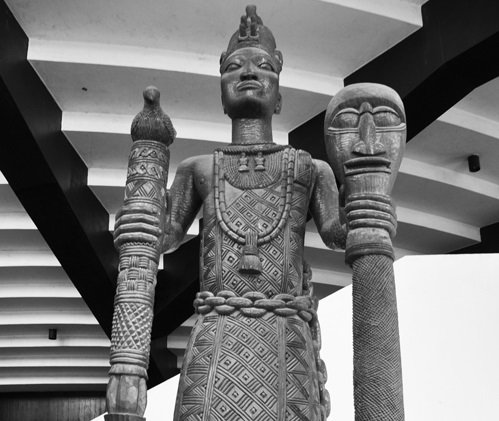When it comes to ancient civilizations, we often think of Egypt, Mesopotamia, or Greece. But there's another fascinating story that remains lesser-known yet equally captivating – the ancient origins and Ile-Ife. This city, nestled in the southwestern part of Nigeria, holds a treasure trove of history, culture, and mythology. Let’s embark on a journey to uncover the mysteries of Ile-Ife, a city often regarded as the cradle of the Yoruba civilization.

The Mythical Beginnings of Ile-Ife
The Creation Myth
Ever wondered where the world began? According to Yoruba mythology, it all started in Ile-Ife. The ancient origins and Ile-Ife are deeply rooted in the creation myth, where the god Obatala was tasked by the supreme deity Olodumare to create the earth. With a snail shell filled with sand, a white hen, and a chameleon, Obatala descended from the heavens. As he spread the sand, the hen scratched it, creating the land, and the chameleon tested the solidity. Thus, Ile-Ife was born, becoming the first land on earth.
The Divine Lineage
Ile-Ife is not just a place; it's the heart of Yoruba spirituality. The city is believed to be the residence of the gods, and it's where the first Yoruba king, Oduduwa, descended to establish his kingdom. Oduduwa is a central figure in the ancient origins and Ile-Ife, as he's considered the progenitor of the Yoruba people. His descendants went on to establish other Yoruba kingdoms, spreading the culture and traditions of Ile-Ife far and wide.
Historical Significance of Ile-Ife
Archaeological Discoveries
The ancient origins and Ile-Ife are not just confined to myths. Archaeological findings have provided tangible evidence of its historical significance. In the early 20th century, British archaeologist Leo Frobenius discovered exquisite bronze and terracotta sculptures in Ile-Ife, dating back to the 12th century. These artifacts showcased the city's advanced metallurgical skills and intricate artistry, suggesting a highly sophisticated society.
The Ile-Ife Kingdom
At its peak, Ile-Ife was a powerful kingdom with a well-organized political and social structure. The city was ruled by the Ooni, a sacred king believed to be a descendant of the gods. The Ooni's palace, a sprawling complex, was the epicenter of political, spiritual, and cultural life. The kingdom's influence extended beyond its borders, playing a crucial role in the formation of other Yoruba states.
Cultural and Religious Hub
Spiritual Practices
The ancient origins and Ile-Ife have made it a spiritual beacon for the Yoruba people. The city is home to numerous shrines and sacred groves dedicated to various deities. The most significant is the Ifa oracle, a divination system that guides personal and communal decisions. Babalawos, or priests, interpret the oracle, connecting the people with the divine wisdom of their ancestors.
Festivals and Rituals
Ile-Ife is alive with vibrant festivals and rituals that celebrate its rich heritage. The Olojo Festival is one of the most prominent, honoring Ogun, the god of iron and war. During this festival, the Ooni dons the sacred Are crown, believed to possess mystical powers. The festival is a time of music, dance, and communal bonding, reflecting the deep-rooted traditions of the city.
Art and Craftsmanship
Bronze and Terracotta Masterpieces
The artistry of Ile-Ife is world-renowned, especially for its bronze and terracotta sculptures. These artworks depict human figures with striking realism and detail, showcasing the high level of skill possessed by Ife artists. The ancient origins and Ile-Ife’s craftsmanship have left a lasting legacy, influencing African art across generations.
Traditional Weaving and Beadwork
Beyond sculptures, Ile-Ife is also known for its traditional weaving and beadwork. The city’s artisans create intricate patterns and designs, adorning everything from clothing to ceremonial items. These crafts are not only beautiful but also hold cultural significance, representing the identity and history of the Yoruba people.
The Modern-Day Ile-Ife
A Blend of Tradition and Modernity
Today, Ile-Ife is a bustling city that harmoniously blends its ancient heritage with modernity. It is home to the prestigious Obafemi Awolowo University, a center of academic excellence. The city continues to be a pilgrimage site for the Yoruba diaspora, who visit to connect with their roots and partake in traditional ceremonies.
Tourism and Preservation
Efforts are being made to preserve the rich history of Ile-Ife while promoting tourism. Museums, such as the National Museum in Ile-Ife, house numerous artifacts and artworks, offering visitors a glimpse into the city’s glorious past. Guided tours and cultural events provide an immersive experience, ensuring that the ancient origins and Ile-Ife remain alive in the collective memory.
Key Landmarks in Ile-Ife
Ooni’s Palace
The Ooni’s Palace is not just a royal residence but a symbol of Ile-Ife’s enduring legacy. The palace complex includes historical artifacts, sacred shrines, and traditional architecture, making it a must-visit for anyone exploring the ancient origins and Ile-Ife.
Ife Museum
The Ife Museum showcases a stunning collection of bronze and terracotta sculptures, along with other cultural artifacts. It serves as a window into the city’s artistic and historical achievements, preserving the legacy of Ile-Ife for future generations.
Sacred Groves and Shrines
Ile-Ife is dotted with sacred groves and shrines, each with its own unique story and significance. The Osun-Osogbo Sacred Grove, a UNESCO World Heritage site, is particularly notable. Although it's technically located in Osogbo, it's deeply connected to Ile-Ife’s spiritual traditions, dedicated to Osun, the goddess of fertility and rivers.
Obafemi Awolowo University
This prestigious university is a beacon of knowledge and culture. Its architectural design incorporates traditional Yoruba motifs, creating a unique blend of modern education and cultural heritage. The university also plays a significant role in research and preservation efforts related to the ancient origins and Ile-Ife.
Frequently Asked Questions
Q: What makes Ile-Ife significant in Yoruba mythology?
A: Ile-Ife is considered the birthplace of the world and humanity according to Yoruba mythology. It is where the gods descended to create the earth, making it a sacred city.
Q: What are some key artifacts found in Ile-Ife?
A: Some of the most notable artifacts include bronze and terracotta sculptures, which date back to the 12th century. These pieces are renowned for their intricate detail and realism.
Q: How does Ile-Ife influence modern Yoruba culture?
A: Ile-Ife remains a cultural and spiritual hub for the Yoruba people. It continues to influence art, religion, and social practices, maintaining its significance through festivals, rituals, and traditional crafts.
Q: Can visitors explore the historical sites in Ile-Ife?
A: Yes, visitors can explore various historical sites, including the Ooni’s Palace, the Ife Museum, and several sacred groves and shrines. Guided tours offer deeper insights into the city’s rich heritage.
Q: What is the Olojo Festival?
A: The Olojo Festival is an annual event in Ile-Ife that honors Ogun, the god of iron and war. It features traditional music, dance, and the Ooni wearing the sacred Are crown.
Q: How is the legacy of Ile-Ife preserved today?
A: The legacy of Ile-Ife is preserved through museums, cultural festivals, academic research, and tourism. Efforts are continuously made to protect and promote the city’s rich history and traditions.
Conclusion
Ile-Ife is a city where myths and history intertwine, creating a tapestry of rich cultural heritage. From its divine origins and ancient sculptures to its vibrant festivals and modern-day significance, the ancient origins and Ile-Ife offer a fascinating glimpse into the past and its enduring influence on the present. As we delve into its mysteries, we not only uncover the roots of the Yoruba civilization but also gain a deeper appreciation for one of Africa’s most intriguing cultural treasures.


